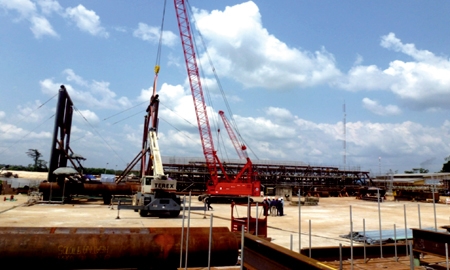
As the oil industry in Nigerian continues to explore further offshore, companies such as Shell, Chevron and ExxonMobil have relied heavily on the unrivalled services offered by Gramen Petroserve Nigeria Ltd. Among these are engineering and construction services, pipeline repairs, mechanical design, civil design and construction of production facilities.
Since its establishment in 1993, it has undertaken several turnkey engineering and construction projects for the Nigerian oil and gas field developments. “We began working with low-level indigenous contractors, to medium level, to ultimately competing with multinationals. We proved that we could compete and were capable of doing a quality job,” says J.A. Aghedo, Managing Director of Gramen Petroserve Nigeria Ltd.
The company’s story reflects that of the Nigerian people, who, Mr Aghedo explains, have moved from occupying jobs of a more physical, hands-on nature, such as welders and fitters, to higher positions in management and engineering.
Multinationals operating in the Nigerian oil fields are turning more and more to indigenous companies like Gramen with proven track records. “For multinationals, working with local Nigerian companies is cheaper and more cost effective,” he says. These companies have higher skilled jobs to offer and that has encouraged Nigerians to advance in their education and training. Nigerians now occupy the majority of posts further up the chain.
So what sets Gramen apart from its competitors? According to Mr Aghedo, one reason is the high level of education, expertise and experience of its workforce. Another is his own personal experience, giving the company a competitive edge. “I am a petroleum engineer, so I know the oil industry very well. Most of my competitors, especially those who are the chairmen or managing directors of their companies, are not engineers. To understand what I’m doing in-house, they would probably have to recruit somebody like me to do it for them,” he says.
On the world stage, Nigerian’s image has been tainted, making investors think twice about doing business in the country. But Mr Aghedo assures that the international media’s perception is far different from the reality. It is worth noting that Goldman Sachs has indentified Nigeria as one of the “Next-11” economies with the most promising future and levels of growth in the 21st century. Its GDP was 7.6 per cent last year, thanks to oil and gas revenues. Annually, the county attracts between $5-$6 billion (£3.1-3.7 billion) of foreign direct investment (FDI), which is 50 per cent of the total FDI in West Africa. Mr Aghedo claims that Nigerian oil production would hit 3 million barrels per day, were it not for the international economic crisis.
Mr Aghedo reflects on this question: “Nigeria’s image abroad is horrible, but you will find a lot of talented Nigerians.” One reason for the country’s tarnished image has been corruption on a political and corporate level, but he notes that: “You will find corruption everywhere, including the UK and US. The people of Nigeria are trying to change that image. There are many Nigerians doing very well in all sectors, both here and abroad.”
He urges the international investment community to “look at Nigeria with a different eye. Invariably the oil production, coupled with our large and diverse population is an investor’s dream.”
0 COMMENTS